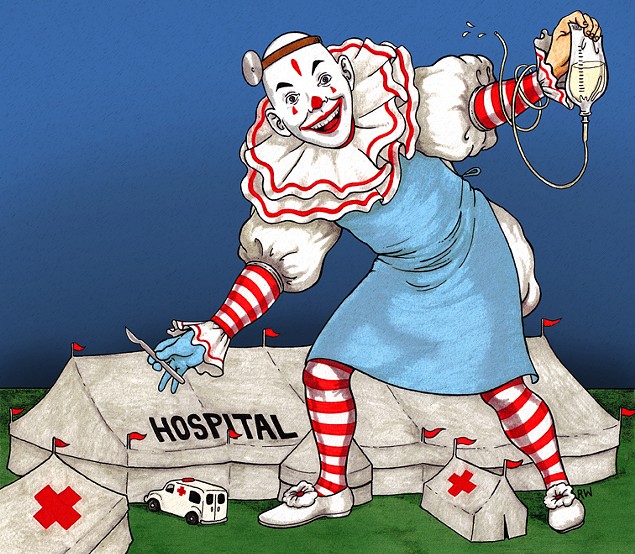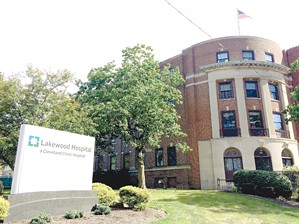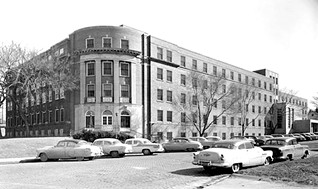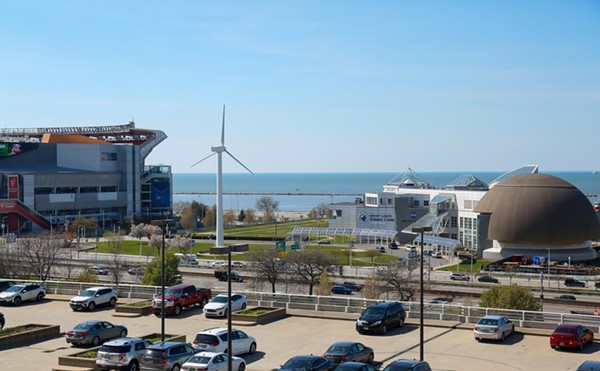Tom Monahan slaps a clipboard onto a long wooden table that runs half the length of his front porch. "We're getting there," he says, gawking from behind a pair of eyeglasses and tossing a ballpoint pen onto the papers. He's talking about gathering thousands of signatures in support of a charter amendment issue for the city of Lakewood. He's talking about saving Lakewood Hospital.
This house where Monahan lives is the house that Dr. C. Lee Graber built in the very early years of the 20th century. The front windows are tucked low into the walls' wooden frames, because Graber's wife, Belle, was an invalid and she liked to sit in her wheelchair and watch the nascent suburb buzz by each day. The city was transforming back then, as it is now.
The Grabers mortgaged their home to open Lakewood Hospital just up the road in 1907, and what was then a 15-bed hub in the center of town soon became a cornerstone for Lakewood, for its culture and legacy. Monahan, a retired Cleveland Press reporter and former assistant safety director in Cleveland, is one of many residents working to keep it that way.
Cleveland Clinic, which operates the hospital, has signaled its intent to close and demolish the hospital and open a $34-million outpatient "family health center" in its place. Despite the finality with which the argument has been framed, representatives at City Hall have insisted that it's just a proposal. Cleveland Clinic operations are conducted via a 1996 "definitive agreement" with the Lakewood Hospital Association (LHA), a private nonprofit that leases the hospital property from the city. The public owns a majority of the hospital.
Because the arc of Lakewood's biggest story in years has become so distorted and divisive, it's hard to say what will happen. In the words of one City Hall staffer, "It's confusing as heck."
Several things are certain, though. This struggle to save or shutter the hospital is changing the city's landscape — its culture and legacy —irrevocably. And while the closure of Lakewood Hospital isn't a done deal per se, it has been discussed publicly as such all year. Documents obtained from the Clinic show that it's been part of a master plan for at least three years.
"Keeping the hospital open is just not an option," Mayor Mike Summers said during a February meeting of the city's Active Living/Recreation Taskforce. Later in the year, a report published by the Huron Business Advisory group demonstrated that keeping the hospital open in some form is definitely an option. Dissonance like that is where Monahan comes in.
The opposition is not so much the nostalgia trip it may outwardly seem — although, for instance, Monahan's children were all born at Lakewood Hospital, and the building itself remains an iconic symbol for the city. Rather, this struggle is about the bottom line and about civic autonomy. Summers has proclaimed that the new family health center will help make Lakewood the "healthiest city in America." But there's been little accounting for what Lakewood has lost and will continue to lose along the way, and promises of the "healthiest city in America" ring hollow without addressing a litany of other problems that have nothing to do with what operates in that building. But we digress ...
"This is all about money," Monahan says. "So, 'We're going to build our own building and we're going to own it and you can't tell us what to do.' That's the whole nut of this thing. Hey, you guys signed a 30-year lease for this thing, as far as I'm concerned. Honor it."
On Jan. 15 this year, Mayor Summers told his constituents that Cleveland Clinic and the Lakewood Hospital Association would close Lakewood Hospital in 2016 — 10 years prior to the end of long-standing contracts and right in line with the opening of a gleaming, $143-million hospital in Avon. (The Cleveland Clinic has dubbed that new facility a "hospital of the future.") In what was to become a running tagline, Summers insisted in his remarks that "changes in health care" made Lakewood Hospital's 263 inpatient beds and some 1,100 employees outmoded and unsustainable.
Throughout the press conference, the matter was treated as an inevitability. Here's the lead-off sentence, for instance, from the Northeast Ohio Media Group's coverage on that day: "Cleveland Clinic and the Lakewood Hospital Association will close Lakewood Hospital and replace it with a health center by late 2016, officials said today."
But later, City Hall officials began backing away from the finality of it all, describing the Clinic's letter of intent (LOI) as nothing more than a proposal.
On May 31, the Clinic's LOI expired. (Any plan would ultimately need City Council approval — but even after eight months of public vetting, they don't have the five necessary votes.) Still, the letter is a worthy read.
In short, the plan is to dissolve the two anchoring contracts: the lease between the LHA and the city and the definitive agreement between the LHA and the Clinic. A new agreement would be enacted, which would call for the termination of hospital operations and the "wind-down and dissolution" of the LHA. The LHA, created in 1985 by the city to operate a functioning hospital in Lakewood, would pay for its own dissolution, as well as the demolition of the hospital.
Nearly all assets — hospital equipment and otherwise — would be transferred to Clinic ownership, and the city would sell the future family health center land parcels to the Clinic. The leftover 5.7 acres of land would be set aside for the city's future development. "Economic development needs to be our highest priority," finance director Jennifer Pae said, describing the city's goals, in April. The hospital land sits a few blocks east of "downtown Lakewood," a newly revitalized commercial corridor on Detroit Avenue.
After the smoke clears, Lakewood would have on its hands a family health center, much like East Cleveland's Stephanie Tubbs Jones Health Center, and a nonprofit wellness foundation. The health center would include an emergency room and a range of outpatient services. Critics use the phrase "referral center," noting that Lakewood patients will likely be transferred to wholly owned Clinic hospitals like Fairview or Lutheran. The Clinic would give $24.4 million and 16 subsequent annual payments of $500,000 to the foundation for personnel costs and health-related services: $32 million all told. How that money is spent — like much in the foundation's inner workings — remains to be seen. (The cash transactions also permit the Clinic a future "naming opportunity.")
The nut of this thing, though, is market share. Per the plan, the Clinic would be "principal health care system affiliate" of the foundation and would retain first refusal rights for any partnership with a wellness program or service that pulls in at least $500,000 in revenue. And despite the city's repeated claims that the health care marketplace is highly competitive in Northeast Ohio, the Clinic has balked at the idea: "Unless the Clinic were to grant prior approval," the letter states, "no health care system provider would be permitted to operate or manage a facility ... on the land currently leased by the city to LHA while the Clinic owns and operates the [family health center.]" MetroHealth, the community later learned, had twice submitted its own proposal that would have maintained inpatient hospital operations and contractual obligations. Attorneys there have since backed away.
There's also the provision in the LOI that the city may not pursue legal action — for example, breaches of contract — against the Clinic or the LHA. The Clinic specifically insists that the mayor, a member of the LHA, publicly support this transition.
The letter may have expired, but the idea remains very much alive. The mayor's big announcement — the plan, concrete or abstract as it is — has set a community to wrestling with its past, present and future.
The city and the Clinic have, in some ways, always had a bit of an odd relationship. When the Clinic wanted to come into Lakewood in the mid-'90s and open a hospital north of Detroit, negotiations culminated with the Clinic taking over Lakewood Hospital and the LHA overseeing operations — serving the will of the public, in theory.
The LHA, a Clinic-dominated board that includes two council members and the mayor, is seen by the public as an outpost of Clinic policy. Its purpose, though, is to represent the city's interests through the lease it maintains. With, for instance, $91 million in estimated deferred maintenance on the hospital property to date, the public has questioned the aptitude of the LHA — now more than ever.
Lakewood Hospital was never the hallmark of the Clinic's innovative portfolio. Even in the past 20 years, under Clinic rule, the place has functioned as a community hospital, a bigger and more modern version of what Dr. C. Lee Graber envisioned 100 years ago.
Over time, though, medical services and specialties came and went. In 2010, under then-mayor Ed FitzGerald, the LHA adopted a contract revision with the Clinic that ushered in the Vision for Tomorrow plan — a comprehensive policy shift that would mark Lakewood Hospital a "center of excellence" in four specialties. In return, the hospital would lose its pediatric and trauma care programs. Monahan and the Save Lakewood Hospital contingent point to this as the beginning of the current crisis, one helmed by the Clinic itself.
"Lakewood Hospital is committed to the Lakewood community and will continue to maintain its status as the city's major employer," Clinic officials wrote in a 2010 letter to FitzGerald. City Council approved the Vision for Tomorrow plan with the public intent to continue operations through the lease and agreement's expiration in 2026.
Now, this latest contract revision — merely a "proposal," as it were — would eliminate the hospital entirely. The LHA's $1.15 million in lease payments to the city, the nearly $1 million in payroll taxes, the $5 million in required capital improvements annually: The city would immediately lose a bevy of financial benefits. And the Clinic's $7 million in annual charity would disappear too, replaced with a foundation outfitted with $32 million paid over eight years.
The $32 million is a major carrot here. As the city reckons with the Clinic's ideas, the $32-million end game has become attractive to many. It's a blank slate.
Instantly, battle lines were drawn. State senator Michael Skindell, a Lakewood resident, pulled petitions to run against Summers in the mayoral race this year. A lawsuit was filed, alleging breaches of contract and fiduciary duty. Legions of residents asked: Where did this come from? Why does the hospital need to close? Don't we have another decade to continue negotiating? Others responded: This is the best thing for the city. This is the future.
The details were heavy, but the news didn't come as a shock to most people in Lakewood. Rumors about the demise of the hospital had circulated informally for years. Scene took its stab in 2013 at tracking down the details of dwindling services, only to be met time and time again by physicians or other stakeholders unwilling to talk. But Jim O'Bryan, the publisher of the Lakewood Observer and a long-ago classmate of Summers (Lakewood High School class of '72), pushed the over-the-fence talk into the open.
On Dec. 29, 2014, O'Bryan dumped the story online: "Clinic to Announce Changes to Lakewood Hospital in 1st Quarter." His reporting bore out the following month with Summers' announcement.
O'Bryan tells Scene that the Clinic's LOI was read over the phone to him in September 2014. The rumors had been true. Before publishing, though, he ran the discovery past city officials.
"Nothing has been decided at this point," Summers wrote to O'Bryan in a now-published email sent at the time. During the fall of 2014, City Hall routinely denied that a plan was in the works to shutter the hospital, making January's announcement all the more alarming to the public.
The publisher of the Lakewood Observer structures his paper around the voices of the community. He'll publish whatever anyone would like to submit, whether that be an opinion piece from City Council President Mary Louise Madigan or a coifed-up press release from one of Lakewood's countless local community organizations. It is the archetypal town square in print form, and there are plenty of rumors that don't come to fruition.
City chatter became divisive very early though, as this particular one bore out the truth. Much of the early reaction was emotional — either from those who wanted the hospital to remain open or from those who were eager to take advantage of whatever opportunities came with a new wellness foundation and health center. But then there were those who pushed and prodded against the headlines, who sought and received public documents that painted a more deliberate path to the hospital's doom. When the lawsuit (filed by former Lakewood City Councilman Ed Graham, Save Lakewood Hospital chairwoman Marguerite Harkness, William Grulich, Deborah Meckes and Amy Dilzell) dropped in May, the $400 million in damages sought by the public became hard to ignore.
The general story touted by the city is that "changes in health care" and "declining patient volumes" had forced the mayor's hand. But as the opposition described to Scene, the Cleveland Clinic can pretty much dictate who goes where — i.e., which and how many Northeast Ohio patients take their health care business to which Clinic outpost. With services like pediatrics and trauma care being shipped elsewhere in the Clinic network from Lakewood Hospital, patient volumes began decreasing ipso facto. What patients were left were more often enrolled in Medicaid and Medicare, kicking Clinic profits down another notch.
Very quickly, residents chipped away at claims that "changes in health care" were driving the losses. Puzzle pieces began locking into place. The data points that were being used to justify the hospital's closure were direct consequences of the Clinic's evolving policies over the past 10 years.
The city would be entertaining a different conversation entirely if the move was about health care. But residents like O'Bryan and others who post frequently on the Observer's online forum — "The Deck" — called the deal out on its one-sided financials and market consolidation. City council members and LHA supporters fired back, calling the Deck's posters "nasty" and "mean-spirited." But the citizen journalists of the Observer kept digging.
What was in it for Lakewood? A wellness foundation with $32 million in cash?
O'Bryan likes to reference Bridgegate, the scandal that roiled out of New Jersey governor Chris Christie's office, the one where he, allegedly, created traffic jams in Fort Lee, N.J., as political retribution. "This is like if Chris Christie sold the bridge and gave the money to his best friend's new nonprofit," he says.
There's the rhetorical process, which plays out at council meetings weekly and online every day. There's the political process, which will play out within the mayoral race, two council races, and the charter amendment issue on Nov. 3. And there's the legal process, which is bumbling along as a civil case in Cuyahoga County, a massive contract violation suit brought by taxpayers and leveled against the city, the LHA, and the Clinic.
"We think the lawsuit is going to be a long-term point," Monahan says, adding that an election day victory of Skindell over Summers — or the passage of the charter amendment — would change the course of the Clinic's actions entirely. Skindell has promised to do what he can to keep the hospital open and functioning. There's been almost no movement in the mayoral campaigns and there are no scheduled debates, but there's more at stake this time around than in elections past.
As the city trips toward Nov. 3, the lawsuit plays like a droning bass line. The case was brought by five Lakewood residents who, in their words, "represent a large and growing group of City residents and Lakewood Hospital employees who are disgruntled by the lack of diligence by the City to enforce its rights against LHA, CCF, and LHF under the Lease and [Definitive Agreement]."
"With the dawn of new plans to help Lakewood Hospital adapt to alleged changes in health care," the legal complaint alleges, "a series of events contrary to the best interests of Lakewood Hospital occurred." The argument set forth in the lawsuit — and by plenty of anecdotal evidence bandied about town — is that the declining patient volumes and revenues are a "'created reality' manufactured by CCF for the sole purpose of pursuing its self-serving strategic plan to support its wholly owned hospitals, including its new Avon Hospital and existing Fairview Hospital and Lutheran Hospital."
Health care consultants Subsidium, paid by the city and also named as a defendant in the suit, reported that the "[n]ew Avon hospital will likely cannibalize significant inpatient volumes from [Lakewood Hospital]."
What the hospital administration blames on the market, the plaintiffs are calling a deliberate plan to skin back hospital services. (More than one person has referenced the "chicken and the egg" riddle in talking about this.) And while the discovery process is progressing slowly before Judge John O'Donnell, several illuminating records have surfaced among more than 7,000 documents subpoenaed to date, including the 2012 "decanting" plan, part of a Master Plan commissioned by the Clinic in 2011.
The three-phase decanting plan outlines everything: Vacate the current hospital, open up the family health center, demolish what's left. (According to the 2012 documents, the final demolition phase was anticipated to begin in August 2016, much like Summers' eventual announcement indicated.) In vacating the hospital of its physical assets and medical services, the Clinic had orchestrated a timetable of moving beds or the catheterization lab or inpatient surgical procedures to Fairview Hospital and other Clinic hospitals.
Part of the lawsuit will involve deciding whether this was a "secret plan to siphon valuable medical services and equipment so as to cripple the viability of the hospital," or just precautionary planning for the future of an ever-expanding health care system.
And it's not as though this sort of maneuvering is new to the Clinic's Northeast Ohio empire. In 2011, the health care system closed Huron Hospital, a 211-bed institution in East Cleveland. Huron was a major eastside trauma care center.
At the time, the Clinic pushed through a plan to shut down the hospital without input from city stakeholders. The hospital was replaced with a $25-million community health care center, which features outpatient care and mental health services. The Clinic kept its spot in East Cleveland, and the expansion into the exurbs continued.
In August 2014, two inspectors from the Ohio Department of Health visited Lakewood Hospital and looked into the state of its adult cardiac catheterization lab and its open-heart surgery program. They found that the hospital "failed to utilize the required on site adult open heart surgical suite or maintain qualified staff on the facility's cardiovascular surgical staff roster." This is one example, touted often as debate continues, of the Clinic rearranging its own chess pieces.
Hospital leadership insisted that the announcement of the hospital's closure and the subsequent barrage of news stories precipitated anxiety and, inevitably, financial losses across the board. But state documents show that the Clinic had, for instance, arranged for the losses in heart surgery patients in Lakewood. The last open heart surgery at Lakewood Hospital was performed in 2007; all surgery patients since then had been sent to Fairview Hospital, even as both open heart suites at Lakewood remained "fully operational" and were "always kept ready." The staff had been sent to Fairview, as well.
"[T]he dedicated and qualified cardiac open heart surgical team for the facility were in fact all on their sister facility's (Fairview Hospital) staff roster," according to a Department of Health document. An on-site interview conducted by health department employees with a staff member at Lakewood Hospital confirmed that the Clinic had designated Fairview Hospital as the open heart surgery site for the area. "Patients who underwent cardiac catheterization at Lakewood Hospital and required subsequent open heart surgeries were all transferred to Fairview for cardiac surgery."
Despite having functional heart surgery suites on-site, the Clinic had been shuttling patients — some in need of emergency surgery, others less so — 3.3 miles to Fairview Hospital.
In response, the hospital administration decided to shut down the programs in February 2015. EMS staffers and drivers were notified thereafter.
The termination of the program has been discussed often at council meetings lately. Councilman Tom Bullock, a member of the LHA, has defended Lakewood Hospital's termination of the cath lab.
"An inspector came ... and took a different view of the fitness of Lakewood Hospital's cath lab, which had no medical emergency problems providing the services for some years — since 2007, I believe, through 2014," he said Sept. 8. "Nevertheless, this inspector said, 'It's not up to the rules. I'm going to go back to Columbus and point that out.'"
During the May 13 meeting of the LHA board, Lakewood Hospital president Shannan Ritchie said that there was "no appeal" against the Department of Health review.
The cath lab review and termination — and subsequent debate — is a distillation of how Lakewood leaders and residents have blended opinion and fact into today's circus act. Regarding public assets, multiple stories have spun out into the community.
"There is a perception that Cleveland Clinic chose to invest in Avon and Fairview, and not in Lakewood. What do we say when people voice this?" Monique Smith, a city employee, said at a Feb. 3 meeting of the Active Living/Recreation Taskforce, the same meeting during which the mayor insisted that keeping the hospital open is "just not an option."
He replied: "There have been lots of factors that have contributed to the Hospital shutting down. People have moved away, wealth has shifted. Furthermore, there is history with the Clinic's involvement with the Hospital. When they took over in 1996, it was not an easy transition, but it probably added another several years to the Hospital's operations that wouldn't have otherwise existed. Furthermore, Lakewood sits on the Lake — it limits potential patrons in terms of lack of service area to the north."
It's an explanation, but not one that gets very far with the opposition and concerned residents, especially when informed by the decanting process.
"It's been eight months since this was announced and we still do not have a decision here," Carl Culley said, addressing City Council. Culley is an internist at Lakewood Hospital and a member of the hospital's board of trustees. His exasperation at the delay is not unique.
The Tuesday after Labor Day brings another big crowd to council chambers. Culley is one of dozens of stakeholders who have spoken at City Council meetings this year on the hospital matter. On council's agenda for this evening is a resolution that would authorize law director Kevin Butler and the city's attorneys to begin "negotiations" with the Cleveland Clinic and the Lakewood Hospital Association. The measure passes unanimously.
Whatever plan these negotiations produce will still have to earn five votes from council to be enacted.
Dr. Terry Kilroy, a pulmonary specialist practicing in Lakewood, insists that each side in a negotiations process comes to the table with an argument, an end. The Clinic's end, he tells council, is clear; it's spelled out in the letter of intent. The city's end, however, remains unknown. He says it's unclear what claims the city's representation will stake on matters like property values, asset/equipment values, distribution of residual assets (cash), parameters of the function of the building — the entirety of any forthcoming deal.
One side of the room applauds his questions, the other side groans. This is how these meetings go now.
Elsewhere, Save Lakewood Hospital continues to meet. Members brief one another on the lawsuit's progress and on how many signs have been installed in front yards across town.
"When I get into things, I get into things," Monahan says. "And I'm really working my tail off on this one to see it through. I envision us having a great community hospital at the end of this, staffed by independent doctors who want to practice medicine and not the art of gathering money."
The closure of Lakewood Hospital isn't a done deal but, in certain corners of the city, it's been treated as such. One only has to look at the city's own website to know that: In a timeline of Lakewood Hospital's history published there, the "Fall 2015" entry reads: "After public review and discussion and if definitive agreement is approved, Cleveland Clinic breaks ground on the new Lakewood Family Health Center."
















